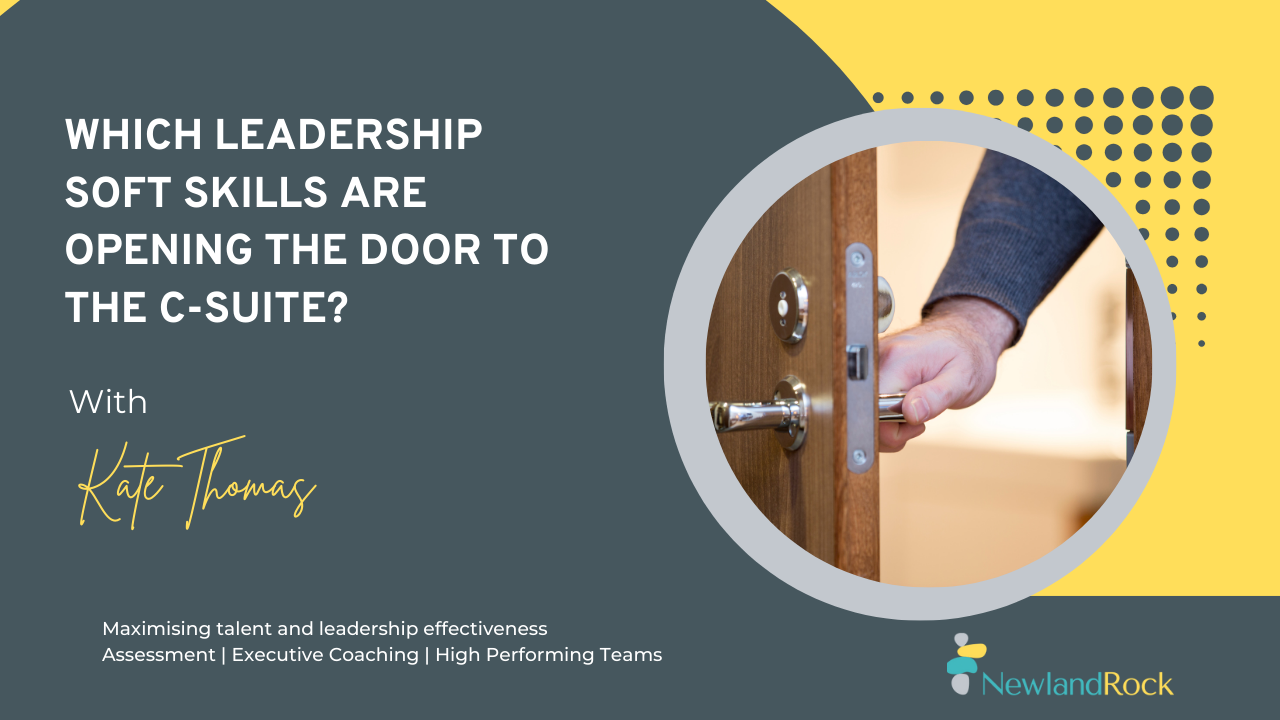Which leadership soft skills are opening the door to the C-suite?
Mar 11, 2025
Identifying senior leaders has changed. The traditional corporate pedigree that used to open the door to the c-suite is no longer a major determinant for securing top jobs.
The capabilities required of our new breed of leader means often the ‘softer’ and less easily recognised skills are now topping the list for many of the senior-most roles. The US Military coined the phrase ‘soft skills’ more than 50 years ago to improve workflow and learning efficiency. Today that phrase is now more suited to leadership characteristics needed to form strong connections with others.
We now live in a VUCA world, another military acronym short for volatility, uncertainty, complexity and ambiguity. The need to hone these soft skills is essential as leaders learn how to effectively navigate how they work. Purpose, transparency and agility are key characteristics.
It’s staggering how few businesses achieve their strategic objectives. Even with the best laid out plans co-created with top strategic consultancy you still need a leadership team with the right soft skills to execute your strategy. Helping your leaders hone their soft skills means their capacity for strategic execution will improve and ultimately improve the bottom line of the business.
What Does ‘Soft Skills’ really mean?
According to a recent study reported in the Harvard Business Review, out of 5000 job descriptions for C-suite roles the number one qualification that ranks higher than any other is strong social skills.
This focus on social skills tends to marry up with the need for senior leaders to be less operational and more focused on communication, coordination and facilitating problem-solving within their teams. The ability to be able to communicate effectively and interact well with others has become even more important post-pandemic in our hybrid and increasing technology-driven, global working environments.
C-Suite Social Skills Matter
Whilst being an excellent communicator is highly prized, also being able to lead empathetically and perceive the needs of those around you is another vital skill. Organisations need to priorities how they identify these soft skills and align with succession plans and focused executive development. Identifying these types of softer skills is where NewlandRock support several organisations. An unbiased, external view combined with deep behavioural science assessment techniques that becomes a key component to getting this talent strategy right.
Kate Thomas explains,
“Being able to identify the right candidates and gather scientific evidence of their suitability is essential when interviewing for those key soft skills or relational characteristics. The assessment techniques we use allow us to assess not just the immediate capability and fit of a candidate but also explore their full potential and next step development to support the leaders transition towards that next step”
The challenge senior leaders face particularly when they’re in a digital decision-making role for example, is managing the balance between wanting to achieve a goal and the speed that they want to get there whilst ensuring they are bringing people with them on the journey.
What Does It Mean To Be An Effective Leader in 2023?
Unlike technical skills acquired through knowledge sharing, soft skills are about your personality, what makes you tick, characteristics that define how a person interacts and builds relationships with the people around them. Therefore, you can present outstanding technical experience but how does that experience transfer to your soft skills?
- Can you lead with empathy?
- How do you demonstrate critical thinking?
- What do you do to inspire others and drive collective success?
- How you empower others and remain resilient through change.
Being able to level up your leadership agility is a critical component to being able to lead effectively. Leadership agility can be defined by two pillars, how you’re thinking, and what it is that you’re doing. When a leader brings an agile way of working, they’re curious, inquisitive, and exploring everything around them. They’re asking a lot of questions and exploring the possibilities.
‘If we haven’t done it before, why haven’t we, and what is it that we actually could do?’
They are future focused and energised to break down boundaries and to instil something different.
This type of leader brings exceptional soft skills to their agile ways of working. They think broadly about who else needs to be involved to achieve an objective. They acknowledge that their audience is broader and more diverse. Who can add a perspective to ensure that they are exploring everything that there is to explore whilst demonstrating a level of empathy on how you’re doing it.
Without developing those soft skills and the ability to lead effectively what can actually happen is that you have an agile leader who is full throttle, throwing out all the ideas and looking like they’re moving forward and going in the right direction, but if there isn’t that level of empathy with communication skills in terms of how they’re doing it they will end up standing there on their own with just a few allies standing next to them.
From a hiring point of view being able to assess candidate fit for these skills will become ever more important. Guy Day from executive search firm BartonRock explains:
“How will leaders who meet these new standards be identified? The increased focus on softer skills and an agile style of leadership will need to be evidenced via a selection of tools at the recruiter’s disposal. More and more we are looking at utilising AI and candidate self-assessment tools alongside expert conversational interviews designed to evoke a more natural response. Being flexible and able to expand beyond the standard recruitment processes and utilise a wider range of tools and techniques will become ever more important. According to Linkedin’s 2019 Global Talent Trends Report, 89% of recruiters said failed hires were due to a lack of soft skills.”
The HBR article referenced earlier goes on to highlight that the evolution of skills required in the C-Suite parallels development in the whole workforce. At all employment levels today, more and more jobs require highly developed social skills.
For more information on executive coaching, succession planning and leadership assessment contact Kate at NewlandRock. For further information on executive recruitment for digitally transforming companies, contact Guy Day at BartonRock.
Facebook | LinkedIn | Instagram
Leadership Effectiveness is the rock of every business. NewlandRock increases leadership effectiveness for talent-savvy companies and individuals going through a transition.
Focused on Assessment | Executive Coaching |High Performing Teams – Internationally


